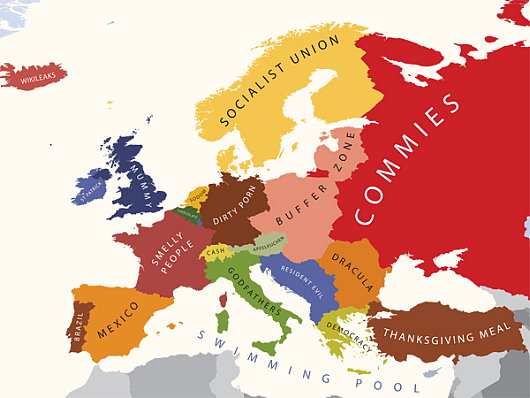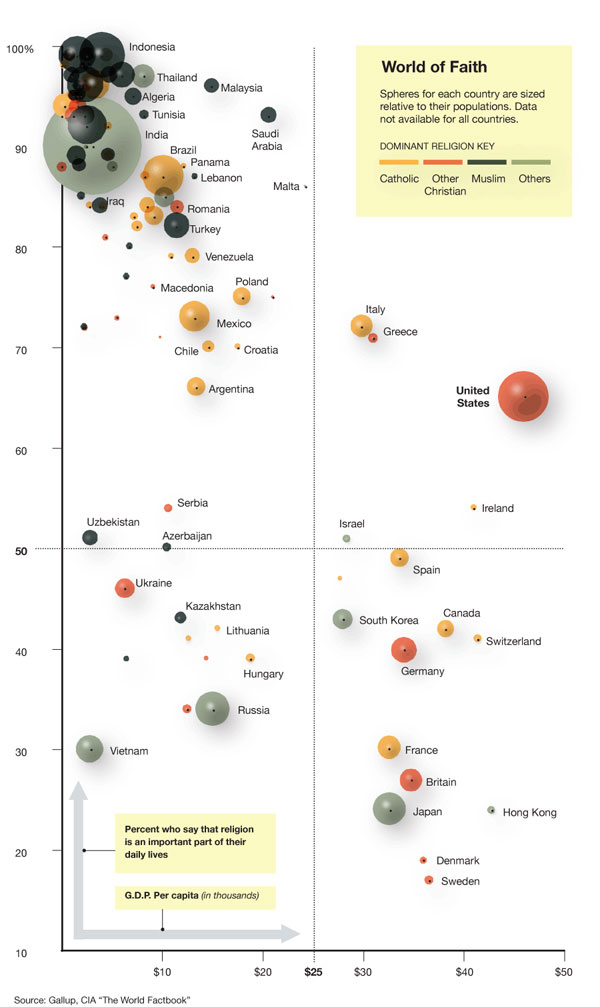No, this isn't some fancy Photoshop trick, these are real human footprints ingrained in a hardwood floor. 70 year-old Buddhist monk Hua Chi has been praying in the same spot at his temple in Tongren, China for over 20 years. His footprints, which are up to 1.2 inches deep in some areas, are the result of performing his prayers up to 3000 times a day. Now that he is 70, he says that he has greatly reduced his quantity of prayers to 1000 times ...
"Shared ramblings/ findings
Wednesday, September 29, 2010
Tuesday, September 28, 2010
Wednesday, September 22, 2010
Europe According to Stereotype
A London-based graphic designer has created a series of maps depicting Europe according to the national stereotypes in the minds of various peoples. Yanko Tsvetkov, a Bulgarian living in Great Britain, created the first one in 2009 in the midst of the energy dispute between Russia and the Ukraine. Russia was labelled “Paranoid Oil Empire”, the Ukraine “Gas Stealers”, and the E.U. as “Union of Subsidized Farmers”. Switzerland was simply “Bank”.
“I created the first one in 2009 because at that time there was an energy crisis in Europe,” Mr. Tsvetkov said. “I just created it to amuse my friends but when I put it up on my website so many people liked it that I decided to really focus on the project of mapping the stereotypes based on different places in Europe. I was surprised by the reaction because I never really expected it to take off like this.”

Europe according to the French.

Europe according to the Germans.

Europe according to the Italians.

Europe according to the British.

Europe according to the Americans.
Monday, September 20, 2010
Sunday, September 19, 2010
Boy drops DS in gorilla cage, inadvertently creates the best photo op ever
GamesRadar · Login | Join. Login with Facebook. Home · Xbox 360 · Xbox 360 Home · Features · News · Reviews · Previews · Videos · Screenshots · Cheats · Guides · All Xbox 360 Games · Xbox 360 Forums · PS3 · PS3 Home · Features · News · Reviews · Previews · Videos · Screenshots · Cheats · Guides · All PS3 Games · PS3 Forums · PS2 · PS2 Home · Features · News · Reviews · Previews · Videos · Screenshots · Cheats · Guides · All PS2 Games ...
"Monday, September 13, 2010
owl in a hat
India got a number of the flockers to gawk at the cuteness, so I figured the photo demanded a posting here.

More Poverty = More Religion
Religion has a surprisingly high correlation with poverty, according to a Gallup survey conducted in more than 100 countries. The more poverty a nation has, the higher the “religiosity” in that nation. In general, richer countries are less religious than poorer ones.
The biggest exception? The United States, which has the highest religiosity relative to its wealth on the planet.
>
Religion & Poverty
>
Hat tip Flowing Data
>
Sources:
Religious Outlier
CHARLES M. BLOW
NYT, September 3, 2010
http://www.nytimes.com/2010/09/04/opinion/04blow.html
Religiosity Highest in World’s Poorest Nations
United States is among the rich countries that buck the trend
Steve Crabtree
Gallup, August 31, 2010
http://www.gallup.com/poll/142727/religiosity-highest-world-poorest-nations.aspx
Monday, September 6, 2010
Op-Ed Columnist: America’s History of Fear
America’s History of Fear
By NICHOLAS D. KRISTOF
Published: September 4, 2010
A radio interviewer asked me the other day if I thought bigotry was the only reason why someone might oppose the Islamic center in Lower Manhattan. No, I don’t. Most of the opponents aren’t bigots but well-meaning worriers — and during earlier waves of intolerance in American history, it was just the same.
Fred R. Conrad/The New York Times
Nicholas D. Kristof
On the Ground
Share Your Comments About This Column
Nicholas Kristof addresses reader feedback and posts short takes from his travels.
Go to Columnist Page »
Screeds against Catholics from the 19th century sounded just like the invective today against the Not-at-Ground-Zero Mosque. The starting point isn’t hatred but fear: an alarm among patriots that newcomers don’t share their values, don’t believe in democracy, and may harm innocent Americans.
Followers of these movements against Irish, Germans, Italians, Chinese and other immigrants were mostly decent, well-meaning people trying to protect their country. But they were manipulated by demagogues playing upon their fears — the 19th- and 20th-century equivalents of Glenn Beck.
Most Americans stayed on the sidelines during these spasms of bigotry, and only a small number of hoodlums killed or tormented Catholics, Mormons or others. But the assaults were possible because so many middle-of-the-road Americans were ambivalent.
Suspicion of outsiders, of people who behave or worship differently, may be an ingrained element of the human condition, a survival instinct from our cave-man days. But we should also recognize that historically this distrust has led us to burn witches, intern Japanese-Americans, and turn away Jewish refugees from the Holocaust.
Perhaps the closest parallel to today’s hysteria about Islam is the 19th-century fear spread by the Know Nothing movement about “the Catholic menace.” One book warned that Catholicism was “the primary source” of all of America’s misfortunes, and there were whispering campaigns that presidents including Martin Van Buren and William McKinley were secretly working with the pope. Does that sound familiar?
Critics warned that the pope was plotting to snatch the Mississippi Valley and secretly conspiring to overthrow American democracy. “Rome looks with wistful eye to domination of this broad land, a magnificent seat for a sovereign pontiff,” one writer cautioned.
Historically, unreal suspicions were sometimes rooted in genuine and significant differences. Many new Catholic immigrants lacked experience in democracy. Mormons were engaged in polygamy. And today some extremist Muslims do plot to blow up planes, and Islam has real problems to work out about the rights of women. The pattern has been for demagogues to take real abuses and exaggerate them, portraying, for example, the most venal wing of the Catholic Church as representative of all Catholicism — just as fundamentalist Wahabis today are caricatured as more representative of Islam than the incomparably more numerous moderate Muslims of Indonesia (who have elected a woman as president before Americans have).
In the 19th century, fears were stoked by books written by people who supposedly had “escaped” Catholicism. These books luridly recounted orgies between priests and nuns, girls kidnapped and held in secret dungeons, and networks of tunnels at convents to allow priests to rape nuns. One woman claiming to have been a priest’s sex slave wrote a “memoir” asserting that Catholics killed boys and ground them into sausage for sale.
These kinds of stories inflamed a mob of patriots in 1834 to attack an Ursuline convent outside Boston and burn it down.
Similar suspicions have targeted just about every other kind of immigrant. During World War I, rumors spread that German-Americans were poisoning food, and Theodore Roosevelt warned that “Germanized socialists” were “more mischievous than bubonic plague.”
Anti-Semitic screeds regularly warned that Jews were plotting to destroy the United States in one way or another. A 1940 survey found that 17 percent of Americans considered Jews to be a “menace to America.”
Chinese in America were denounced, persecuted and lynched, while the head of a United States government commission publicly urged in 1945 "the extermination of the Japanese in toto." Most shamefully, anti-Asian racism led to the internment of 110,000 Japanese-Americans during World War II.
All that is part of America’s heritage, and typically as each group has assimilated, it has participated in the torment of newer arrivals — as in Father Charles Coughlin’s ferociously anti-Semitic radio broadcasts in the 1930s. Today’s recrudescence is the lies about President Obama’s faith, and the fear-mongering about the proposed Islamic center.
But we have a more glorious tradition intertwined in American history as well, one of tolerance, amity and religious freedom. Each time, this has ultimately prevailed over the Know Nothing impulse.
Americans have called on moderates in Muslim countries to speak out against extremists, to stand up for the tolerance they say they believe in. We should all have the guts do the same at home.
Friday, September 3, 2010
The Problem with Women Bosses
Andrew R. McIlvaine conducted a study about employee’s reaction regarding women bosses
I work in Marketing division of a big organistion, where most of the employees and bosses are female. Instead of calling my boss’s bosses a pack of BITCHES; I researched if it’s the case with female being in a leadership position. I tend to agree that some of his findings regarding problem with Women Boses are true.
From his research, the opinions about women bosses are as follows:
1.Women bosses were emotional and demanding, with "more to prove" and a penchant to "put on airs."
2."Women have a very narrow path to walk; they risk coming across as a doormat or a bitch," says Robert Sutton
When female bosses try to adopt the characteristics of male bosses -- assertiveness, decisiveness, etc. -- it often backfires, he says. But when they strive to be nice, they're seen as doormats.
3."You'd think female employees would be more understanding of female bosses, but research has consistently shown that women and minorities tend to buy into the stereotypes about themselves -- women tend to be sexist, African-Americans tend to be racist, and so on," he says. "It's pretty depressing."
4."The archetypal authority figure is one that reflects masculine qualities," she says.
"Women are stuck trying to mimic that, while still coming across as feminine, and it doesn't quite work. The fact is, women have fundamentally different approaches to managing than men -- they tend to be more collaborative, more relationship-focused -- yet they're under pressure to conform to the male model," Galbraith says.
Interestingly, as a female, I do feel like I have to mimic man in order to survive in the male dominated work place, and I feel that it’s better to be bitch than a doormat; at least I have some respects.
So… How should a women boss behave?
1.Communicate with your employee, start dialogues with your staff, and pleaseee…… one meeting isn’t enough. FOLLOW UP and FOLLOW THROUGH for your staff.
2.Recognize talents and appreciate your staff’s suggestion, opinions.
3.Be open to critique; make your employee feel at ease, that they could be honest with you.
4.Due to all 3 things above will make you ‘the doormat’, you have one ultimate weapon = The company’s polices, procedure and guideline. Use it and apply it. Adhere it.
This will result in a happier work environment, and happy employees will result in productivity.
7 Habits To Win In Office Politics - Stepcase Lifehack
January 24th, 2008 in Management
7 Habits To Win In Office Politics
office politics
Office politics – a taboo word for some people. It’s a pervasive thing at the workplace. In it’s simplest form, office politics is simply about the differences between people at work; differences in opinions
, conflicts of interests are often manifested as office politics. It all goes down to human communications and relationships.
There is no need to be afraid of office politics. Top performers are those who have mastered the art of winning in office politics. Below are 7 good habits to help you win at the workplace:
HABIT #1 – BE AWARE YOU HAVE A CHOICE
The most common reactions to politics at work are either fight or flight. It’s normal human reaction for survival in the wild, back in the prehistoric days when we were still hunter-gatherers. Sure, the office is a modern jungle, but it takes more than just instinctive reactions to win in office politics. Instinctive fight reactions will only cause more resistance to whatever you are trying to achieve; while instinctive flight reactions only label you as a pushover that people can easily take for granted. Neither options are appealing for healthy career growth.
Winning requires you to consciously choose your reactions to the situation. Recognize that no matter how bad the circumstances, you have a choice in choosing how you feel and react. So how do you choose? This bring us to the next point…
HABIT #2 – KNOW WHAT YOU ARE TRYING TO ACHIEVE
When conflicts happens, it’s very easy to be sucked into tunnel-vision and focus on immediate differences. That’s a self-defeating approach. Chances are you’ll only invite more resistance by focusing on differences in people’s positions or opinions.
The way to mitigate this without looking like you’re fighting to emerge as a winner in this conflict is to focus on the business objectives. In the light of what’s best for the business, discuss the pros and cons of each option. Eventually, everyone wants the business to be successful; if the business don’t win, then nobody in the organization wins. It’s much easier for one to eat the humble pie and back off when they realize the chosen approach is best for the business.
By learning to steer the discussion in this direction, you will learn to disengage from petty differences and position yourself as someone who is interested in getting things done. Your boss will also come to appreciate you as someone who is mature, strategic and can be entrusted with bigger responsibilities.
HABIT #3 – FOCUS ON YOUR CIRCLE OF INFLUENCE
At work, there are often issues which we have very little control over. It’s not uncommon to find corporate policies, client demands or boss mandates which affects your personal interests. Bitching and complaining are common responses to these events that we cannot control. But think about it, other than that short term emotional outlet, what tangible results do bitching really accomplish? In most instances, none.
Instead of feeling victimized and angry about the situation, focus on the things that you can do to influence the situation – your circle of influence. This is a very empowering technique to overcome the feeling of helplessness. It removes the victimized feeling and also allows others to see you as someone who knows how to operate within given constraints. You may not be able to change or decide on the eventual outcome, but you can walk away knowing that you have done the best within the given circumstances.
Constraints are all around in the workplace; with this approach, your boss will also come to appreciate you as someone who is understanding and positive.
HABIT #4 – DON’T TAKE SIDES
In office politics, it is possible to find yourself stuck in between two power figures who are at odds with each other. You find yourself being thrown around while they try to outwit each other and defend their own position. All at the expense of you getting the job done. You can’t get them to agree on a common decision for a project, and neither of them want to take ownership of issues; they’re too afraid they’ll get stabbed in the back for any mishaps.
In cases like this, focus on the business objectives and don’t take side with either of them – even if you like one better than the other. Place them on a common communication platform and ensure open communications among all parties so that no one can claim “I didn’t say that”.
By not taking sides, you’ll help to direct conflict resolution in an objective manner. You’ll also build trust with both parties. That’ll help to keep the engagements constructive and focus on business objectives.
HABIT #5 – DON’T GET PERSONAL
In office politics, you’ll get angry with people. It happens. There will be times when you feel the urge to give that person a piece of your mind and teach him a lesson. Don’t.
People tend to remember moments when they were humiliated or insulted. Even if you win this argument and get to feel really good about it for now, you’ll pay the price later when you need help from this person. What goes around comes around, especially at the work place.
To win in the office, you’ll want to build a network of allies which you can tap into. The last thing you want during a crisis or an opportunity is to have someone screw you up because they habour ill-intentions towards you – all because you’d enjoyed a brief moment of emotional outburst at their expense.
Another reason to hold back your temper is your career advancement. Increasingly, organizations are using 360 degree reviews to promote someone.
Even if you are a star performer, your boss will have to fight a political uphill battle if other managers or peers see you as someone who is difficult to work with. The last thing you’ll want is to make it difficult for your boss to champion you for a promotion.
HABIT #6 – SEEK TO UNDERSTAND, BEFORE BEING UNDERSTOOD
The reason people feel unjustified is because they felt misunderstood. Instinctively, we are more interested in getting the others to understand us than to understand them first. Top people managers and business leaders have learned to suppress this urge.
Surprisingly, seeking to understand is a very disarming technique. Once the other party feels that you understand where he/she is coming from, they will feel less defensive and be open to understand you in return. This sets the stage for open communications to arrive at a solution that both parties can accept. Trying to arrive at a solution without first having this understanding is very difficult – there’s little trust and too much second-guessing.
HABIT #7 – THINK WIN-WIN
As mentioned upfront, political conflicts happen because of conflicting interests. Perhaps due to our schooling, we are taught that to win, someone else needs to lose. Conversely, we are afraid to let someone else win, because it implies losing for us.
In business and work, that doesn’t have to be the case.
Learn to think in terms of “how can we both win out of this situation?” This requires that you first understand the other party’s perspective and what’s in it for him. Next, understand what’s in it for you. Strive to seek out a resolution that is acceptable and beneficial to both parties. Doing this will ensure that everyone truly commit to the agree resolution and not pay only lip-service to it.
People simply don’t like to lose. You may get away with win-lose tactics once or twice, but very soon, you’ll find yourself without allies in the workplace. Thinking win-win is an enduring strategy that builds allies and help you win in the long term.
Wednesday, September 1, 2010
What sort of Tweeter are you?

The many users of Twitter | GDS Publishing
The many users of Twitter
By Timon Singh | 12/15/09 - 16:09
What sort of Tweeter are you?
Be it promoting work, informing friends of your drunken escapades or following Stephen Fry for his latest witty insight, Twitter's usage has grown and developed over the past year. Used both as a business tool and a way of keeping up with the latest tabloid gossip, Twitter has overcome all the critics who thought that a 140-character blogging service had no future.
Not just that, but it is a social networking device that seemingly appeals to everyone - businessmen, celebrities, politicians and the general populous. However, it appears that not everyone uses Twitter for the same purpose. While the ability to send 140 character-long texts is open to everyone, people use the blogging services for different reasons and purposes.
As such, web guru, Guy Kawasaki has determined that there are six types of Twitter users, so which one are you?
via ngonlinenews.com





